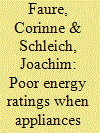|
|
|
Sort Order |
|
|
|
Items / Page
|
|
|
|
|
|
|
| Srl | Item |
| 1 |
ID:
179667


|
|
|
|
|
| Summary/Abstract |
The European Union has decided to replace its previously existing A+++ to D labelling scheme for cold appliances with a rescaled A to G labelling scheme in 2021. Employing a demographically representative discrete choice experiment on refrigerator adoption using an online survey among more than 1000 households in Germany, this paper explores the effects of the rescaled scheme compared to the previous scheme on the stated uptake of top-rated refrigerators, i.e. those classified A+++ under the previous scheme and B under the rescaled scheme. Since in practice both schemes may be shown for a transitory period, the paper also explores the effects of displaying both labels simultaneously. The findings from estimating a mixed logit model suggest that showing the rescaled label alone significantly increases valuation of top-rated refrigerators compared to showing the previous A+++ to D label alone. In comparison, when the previous A+++ to D and the rescaled A to G schemes are shown simultaneously, no benefits of introducing the rescaled label are found. Thus, policymakers should strive to enforce the application of the rescaled labelling scheme as quickly as possible and to shorten transitory periods where both labels are shown simultaneously.
|
|
|
|
|
|
|
|
|
|
|
|
|
|
|
|
| 2 |
ID:
150039


|
|
|
|
|
| Summary/Abstract |
Implicit discount rates (IDRs) are employed in energy models to capture household investment decisions, yet the factors behind the IDR and their respective implications for policy-making usually remain blurred and fractional. The proposed comprehensive framework distinguishes three broad categories of factors underlying the IDR for household adoption of energy-efficient technologies (EETs): preferences (notably over time, risk, loss, debt, and the environment), predictable (ir)rational behavior (bounded rationality, rational inattention, behavioral biases), and external barriers to energy efficiency. Existing empirical findings suggest that the factors underlying the IDRs that differ across household characteristics and technologies should be accounted for in energy models. Furthermore, the framework allows for a fresh look at the interplay of IDRs and policies. We argue that a simple observation of high IDRs (or observing correlations between IDRs and socio-economic characteristics) does not provide guidance for policy-making since the underlying sources cannot be identified. Instead, we propose that some of the factors underlying the IDR - notably external barriers - can be changed (through directed policy interventions) whereas other factors - notably preferences and predictable (ir)rational behavior - are innate and can only be taken into account (through reactive policy interventions).
|
|
|
|
|
|
|
|
|
|
|
|
|
|
|
|
| 3 |
ID:
176658


|
|
|
|
|
| Summary/Abstract |
Conveyance, i.e., leaving one's appliance in the dwelling when moving out, shortens the expected length of ownership of an appliance and may therefore lead to the purchase of less energy-efficient appliances. Employing a demographically representative survey in Spain, this paper uses statistical-econometric analyses to explore the effects of conveyance on stated adoption of energy-efficient appliances (refrigerators or fridge-freezer combinations, freezers, dishwashers, and washing machines). The findings suggest that the take-up of energy-efficient appliances is on average about 8%-points lower when appliances convey. In addition, conveyance appears to have comparable effects for renters and homeowners. These findings therefore suggest that conveyance contributes to explaining the energy efficiency paradox. Finally, the results appear robust to a series of robustness checks involving alternative assumptions about the distribution and data generating process, the specifications of the dependent variable, and the handling of missing values. They also provide insights for policy-making.
|
|
|
|
|
|
|
|
|
|
|
|
|
|
|
|
|
|
|
|
|